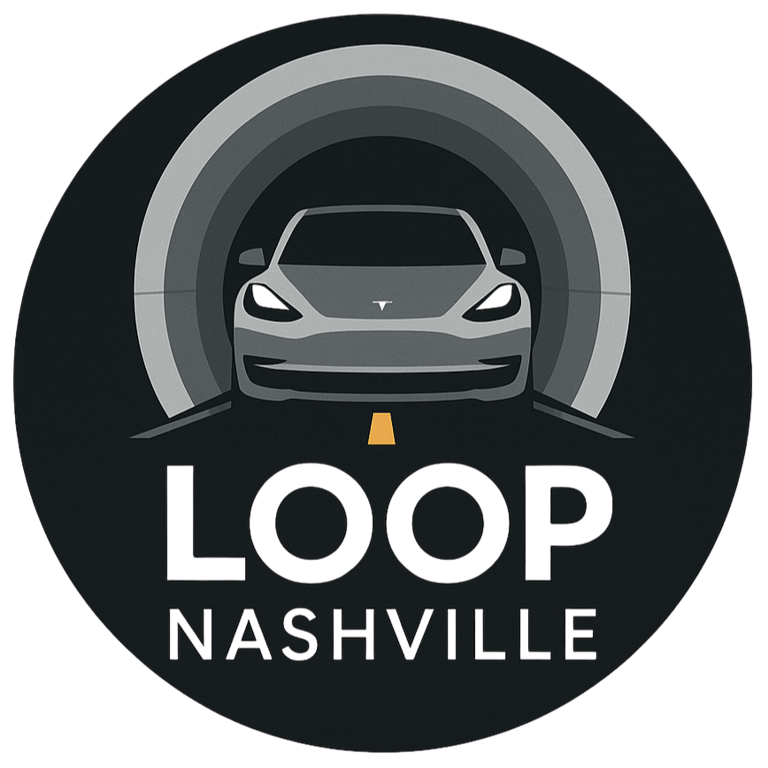Could Tesla’s Robotaxi Ambitions Align with Nashville’s Music City Loop?
As Tesla pivots toward autonomous ride-hailing, Nashville’s proposed Music City Loop could become a testbed for self-driving Teslas in underground tunnels. The project may represent a strategic overlap of Elon Musk’s ventures, blending transit innovation with Tesla’s future mobility model. [Read more ➝]
By the LOOP Nashville Editorial Staff
10/2/20252 min read
Source: The Tennessean
Tesla’s New Direction
Tesla is reshaping its long-term strategy around fleets of autonomous ride-hailing taxis, a move that CEO Elon Musk has described as central to the company’s future. On a June earnings call, Musk told investors that the company expects to bring robotaxi services to large portions of the country by the end of the year, predicting coverage that could reach “half the population of the U.S.”
The shift comes as the electric vehicle industry undergoes rapid change. While Tesla remains the most recognizable name in EV manufacturing, it is increasingly looking beyond car sales toward new forms of mobility. Robotaxis—self-driving vehicles that can be summoned on demand—are now viewed as a key part of that evolution.
At present, Austin is the only city where Tesla operates driverless ride-hailing service without a human behind the wheel. In San Francisco, the service is available but still requires a Tesla employee in the car to monitor performance. The company has also begun trial operations in Florida and Nevada.
Nashville’s Role in the Experiment
Nashville could soon play a pivotal role in this transformation. The proposed Music City Loop, a privately funded system of underground transit tunnels developed by The Boring Company, may provide a rare opportunity to integrate Tesla’s autonomous vehicles into a new kind of infrastructure.
If approved, the Loop would allow passengers to travel through subterranean tunnels in Teslas that no longer require human drivers. It would also mark a unique convergence of two Elon Musk-led ventures, with Tesla supplying the vehicles and The Boring Company managing the tunnels.
The Boring Company has signaled that it will gauge local interest before advancing the plan. In a recent statement, the company emphasized its focus on safety, saying it would work closely with Nashville officials to evaluate the introduction of autonomous vehicles.
Why It Matters to Nashville
For Nashville, the promise of the Music City Loop lies in more than just cutting-edge technology. A system that combines underground transit with autonomous ride-hailing could ease surface-level congestion, provide faster and more efficient trips, and offer a glimpse into the city’s transportation future.
The project would also position Nashville at the forefront of mobility innovation, joining a small but growing list of cities willing to experiment with autonomous systems. If successful, it could attract investment, support new jobs, and demonstrate how urban areas can adapt to rapid changes in transportation.
Challenges Ahead
The road to fully autonomous mobility is far from simple. Tesla will need to secure state-level regulatory approval before it can operate robotaxis in Tennessee. Unlike in many other parts of the country, local governments would not have a role in authorizing operations, but the state’s decision-making process will still require rigorous safety demonstrations.
Public trust will also be essential, as many residents remain cautious about sharing the road—or a tunnel—with self-driving cars. Tesla has already deployed its Full Self-Driving technology in Las Vegas, where vehicles circulate through the Las Vegas Convention Center Loop. For now, a company employee remains in the driver’s seat, a reminder that even as the technology advances, safety testing continues. Nashville may see a similar phased approach, with employees present in vehicles before full autonomy is introduced.
Looking Ahead
As Tesla works to redefine its role in the transportation landscape, projects like the Music City Loop may serve as critical proving grounds. For Nashville, the opportunity is to become one of the first American cities where underground transit and autonomous ride-hailing operate together in a real-world environment.
If the project advances, residents may one day find themselves stepping into a driverless Tesla, descending into a tunnel beneath downtown, and traveling across the city in a system that blends futuristic technology with practical urban transit. It would be a striking example of how Musk’s twin visions—autonomous cars and underground mobility—could come together in Nashville.
Disclaimer
LOOP Nashville aggregates publicly available news, commentary, and editorial content related to the Music City LOOP project. All source material is fully credited and attributed to its original publishers. All commentary and editorial opinions are solely those of the LOOP Nashville Editorial Staff. We are an independent site and are not affiliated with The Boring Company or the Music City LOOP project.
CONTACT
Follow
scoop@loopnashville.com
© 2025. All rights reserved.
